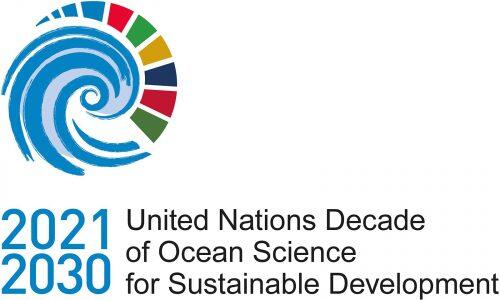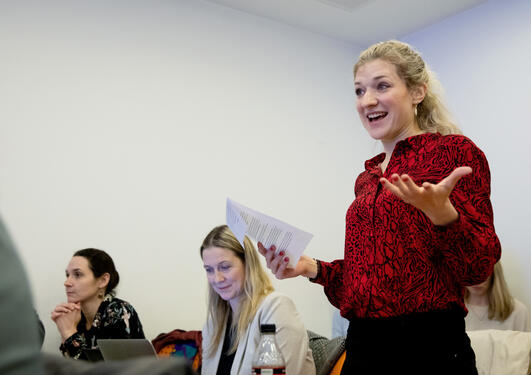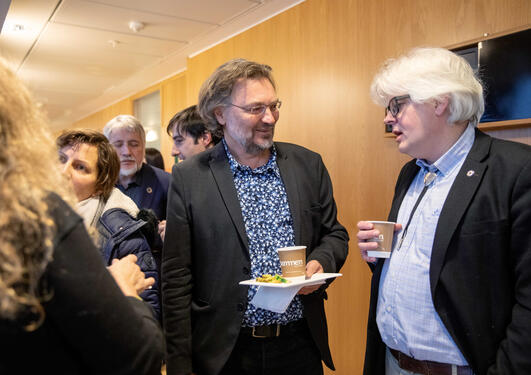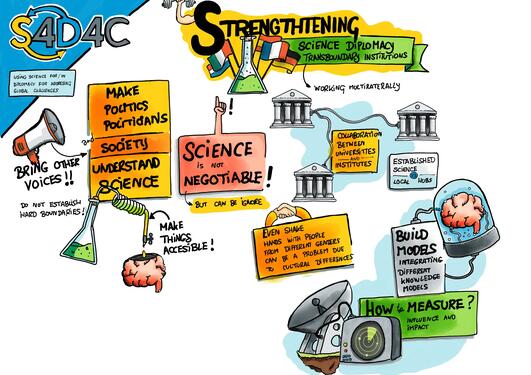Science diplomats unite in Warsaw
UiB law scholar Joanna Siekiera spoke on ocean science diplomacy as part of the reunion of the 2020 Warsaw Science Diplomacy School.

Main content
On 8-10 April 2022, the Warsaw Science Diplomacy School (WSDS) organized a reunion weekend in Warsaw, Poland. The event was a commemoration of the 2nd anniversary of the online WSDS in 2020, during the early stages of the COVID-19 pandemic.
This was a collaboration between the Warsaw based European Academy of Diplomacy, the Horizon 2020 project InsSciDE – Inventing a shared Science Diplomacy for Europe and the Paris based European Academy of Diplomacy. Throughout the pandemic, the partners made efforts to continue the unique network of young scholars from various countries and disciplines, all using science diplomacy (SciDip) in their research methods and professional portfolio.
Postdoctoral fellow Joanna Siekiera represented the University of Bergen (UiB), both digitally in 2020 and in person in 2022. Attending WSDS 2020 enabled her to deepen her interests in ocean diplomacy and ocean governance. Due to her substantial list of achievements, Siekiera was invited by the organizers of the 2022 reunion to give a flash talk, as well as to lead a discussion group for the students of the European Academy of Diplomacy (Academy of Young Diplomats trainees), gathered WSDS alumni and guests cooperating with InsSciDE.
The topic of her lecture was “Ocean Science Diplomacy”, where she presented not only the subject related findings, but also her two years professional and academic progress during the challenging times of COVID-19. The latter part was especially appreciated by the early-stage scholars and students from various continents who are looking to improve their career opportunities and would like to explore a path in ocean science.
The first day of the workshop was organized around the networking possibilities with a goal to create a WSDS alumni association. Participants were welcomed by the InsSciDE coordinators Claire Mays and Pascal Griset. The keynote speaker was Polish academic Dr. Małgorzata Smieszek, who is currently working at UiT – the Arctic University of Norway in Tromsø. She gave a powerful talk on SciDip and international collaboration in the Arctic.
Day two was opened by the founder of the European Academy of Diplomacy Professor Katarzyna Pisarska with her inspiring speech on women’s leadership. The following panel session was held by the female alumnae: “Women's Leadership in Science Diplomacy” by the Albanian researcher Oltjana Beci; “Postcolonialism and Science Diplomacy in the Global South” by the Guatemalan academic Dr. Kleinsy Bonilla; and “Ocean Science Diplomacy” by Dr. Joanna Siekiera.
The afternoon sessions were divided among WSDS alumni, who touched upon the following subjects: “Faith-based organizations in environmental diplomacy” by the Italian researcher Nino Puglisi; “Game theory for science diplomacy” by the Australian academic Nathan McMahon; “Youth in science diplomacy” by the French medical doctor Farah Ouechtati; “Global health diplomacy” by the Zimbabwean research project coordinator Zviko Manjengwah; and “Vaccine diplomacy” by the Brazilian project coordinator Leonardo Rodarte.
The last day of the workshop, Sunday 10 April, was devoted to the institutional arrangements of the WSDS association. All participants agreed to continue this SciDip path, which turned out to be one of the most beneficial and unique research tools in our career. The effects of that journey were visible in a multitude of jointly written articles, launching of new grants and research projects, as well as multinational and cross disciplinary friendships which were born during countless lockdowns and survived the pandemic.




